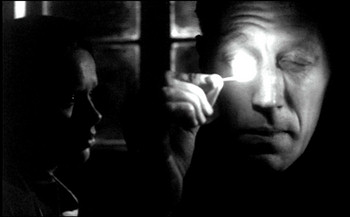 A reliable rule for critical aggregators is that Rotten Tomatoes will almost always be a more extreme number than Metacritic. Put another way, the Metacritic number will generally sit between the Rotten Tomatoes number and 50. This is a function of the up-or-down Rotten Tomaotes system compared to the shadings allowed by Metacritic. (A three-star review is fully positive to Rotten Tomatoes, but only three-quarters positive to Metacritic.) There are so few significant exceptions that it’s worth noting when they crop up. In this week’s Box Office Power Rankings (won, for a second consecutive week, by Gran Torino), there are two: Notorious and Defiance. They both scored 52 at Rotten Tomatoes and significantly higher (61 and 58, respectively) at Metacritic. The obvious explanation is that while critics were roughly evenly split on the movies, those who liked it liked it more than those who didn’t like it didn’t like it. Less stupidly, each got marginally negative reviews and enthusiastic positive ones in equal measure. But I wonder if these special cases speak to some sort of critical fear.
A reliable rule for critical aggregators is that Rotten Tomatoes will almost always be a more extreme number than Metacritic. Put another way, the Metacritic number will generally sit between the Rotten Tomatoes number and 50. This is a function of the up-or-down Rotten Tomaotes system compared to the shadings allowed by Metacritic. (A three-star review is fully positive to Rotten Tomatoes, but only three-quarters positive to Metacritic.) There are so few significant exceptions that it’s worth noting when they crop up. In this week’s Box Office Power Rankings (won, for a second consecutive week, by Gran Torino), there are two: Notorious and Defiance. They both scored 52 at Rotten Tomatoes and significantly higher (61 and 58, respectively) at Metacritic. The obvious explanation is that while critics were roughly evenly split on the movies, those who liked it liked it more than those who didn’t like it didn’t like it. Less stupidly, each got marginally negative reviews and enthusiastic positive ones in equal measure. But I wonder if these special cases speak to some sort of critical fear.
 In April, Rick Moody fulfilled a fantasy that many artists surely have: He delivered a pie to the face of one of his critics. Moody is probably best known as the author of the 1994 novel from which director Ang Lee’s The Ice Storm was adapted. But he’s also famous in some circles for nine words written about him: “Rick Moody is the worst writer of his generation.”
In April, Rick Moody fulfilled a fantasy that many artists surely have: He delivered a pie to the face of one of his critics. Moody is probably best known as the author of the 1994 novel from which director Ang Lee’s The Ice Storm was adapted. But he’s also famous in some circles for nine words written about him: “Rick Moody is the worst writer of his generation.”
 With its
With its  Because I do have a memory – not a very good one, but a memory nonetheless – I can save myself some work by providing Rupert Murray – the filmmaker behind Unknown White Male – with a few lessons I’ve learned from other movies and simply link to previous essays.
Because I do have a memory – not a very good one, but a memory nonetheless – I can save myself some work by providing Rupert Murray – the filmmaker behind Unknown White Male – with a few lessons I’ve learned from other movies and simply link to previous essays. The deaths last week of movie writers and directors Ingmar Bergman and Michelangelo Antonioni have incited
The deaths last week of movie writers and directors Ingmar Bergman and Michelangelo Antonioni have incited  A reliable rule for critical aggregators is that Rotten Tomatoes will almost always be a more extreme number than Metacritic. Put another way, the Metacritic number will generally sit between the Rotten Tomatoes number and 50. This is a function of the up-or-down Rotten Tomaotes system compared to the shadings allowed by Metacritic. (A three-star review is fully positive to Rotten Tomatoes, but only three-quarters positive to Metacritic.) There are so few significant exceptions that it’s worth noting when they crop up. In this week’s Box Office Power Rankings (won, for a second consecutive week, by Gran Torino), there are two: Notorious and Defiance. They both scored 52 at Rotten Tomatoes and significantly higher (61 and 58, respectively) at Metacritic. The obvious explanation is that while critics were roughly evenly split on the movies, those who liked it liked it more than those who didn’t like it didn’t like it. Less stupidly, each got marginally negative reviews and enthusiastic positive ones in equal measure. But I wonder if these special cases speak to some sort of critical fear.
A reliable rule for critical aggregators is that Rotten Tomatoes will almost always be a more extreme number than Metacritic. Put another way, the Metacritic number will generally sit between the Rotten Tomatoes number and 50. This is a function of the up-or-down Rotten Tomaotes system compared to the shadings allowed by Metacritic. (A three-star review is fully positive to Rotten Tomatoes, but only three-quarters positive to Metacritic.) There are so few significant exceptions that it’s worth noting when they crop up. In this week’s Box Office Power Rankings (won, for a second consecutive week, by Gran Torino), there are two: Notorious and Defiance. They both scored 52 at Rotten Tomatoes and significantly higher (61 and 58, respectively) at Metacritic. The obvious explanation is that while critics were roughly evenly split on the movies, those who liked it liked it more than those who didn’t like it didn’t like it. Less stupidly, each got marginally negative reviews and enthusiastic positive ones in equal measure. But I wonder if these special cases speak to some sort of critical fear.